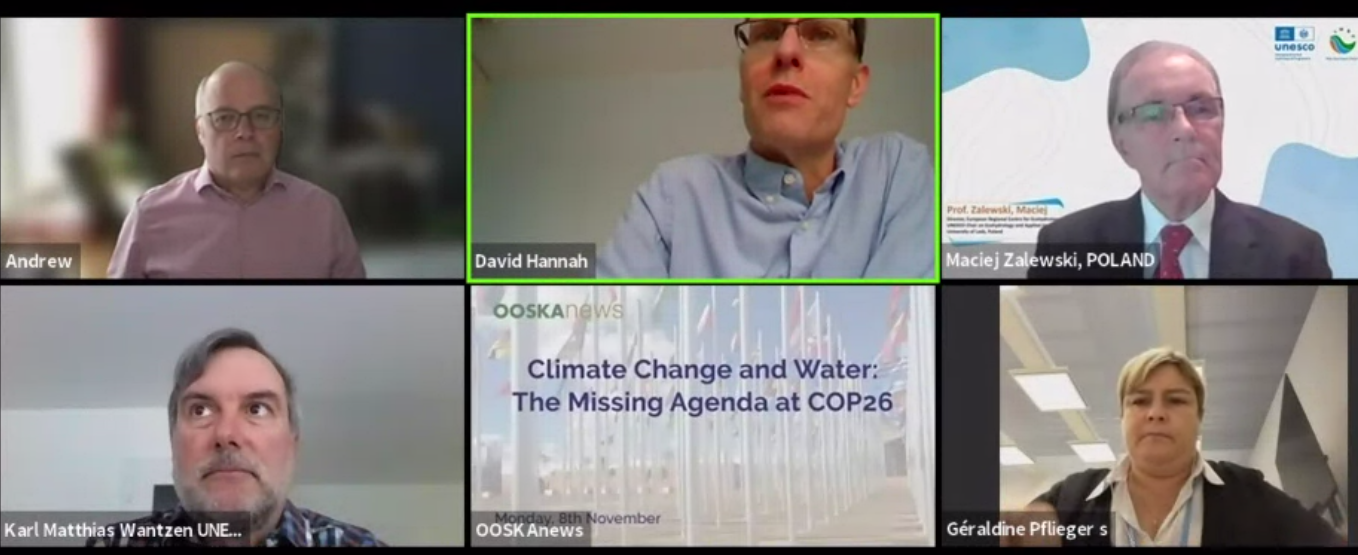From Scotland - Climate Change and Water: The Missing Agenda At This Climate Conference
Virtual Event At COP26 Monday November 8
4 Nov 2021 by The Water Diplomat
DUNDEE, United Kingdom

Footage available online - no registration required:
https://vimeo.com/642651828
Climate Change and Water: The Missing Agenda at COP26 - Full Agenda Below
Water is one of the areas where climate change will have the most impact. The effect of changes in the availability of water is felt across all human society and the environment it relies on for its continued survival. Climate change amplifies existing problems, some of which are the direct result of the cumulative effects of historical greenhouse gas emissions. While water features strongly in successive IPCC reports and the achievement of SDG6 on water is central to the success of the SDGs more broadly, it is much less visible in the context of the COP.
Much of the COP is understandably focused on the Nationally Determined Contributions (NDCs) of parties to the UNFCCC and the extent to which their revision is sufficient to achieve the reduction in greenhouse gas emissions the world needs. Adaptation has a less high profile at this stage, but successful implementation of adaptation plans relies on governance frameworks that are robust. This is not a given, even in developed countries, so linking adaptation techniques with the legal, policy and institutional contexts that they need in order to work properly, is absolutely crucial.
The UNESCO Centre for Water Law, Policy and Science at the University of Dundee convened a meeting on the Adaptation and Loss and Damage day of the COP, the 8th of November, bringing together international experts from the UNESCO Water Family. The goal of the meeting is to highlight the critical role of water in relation to both Adaptation and Loss and Damage, and to underscore the importance of adequate governance if practical solutions are to be found. The meeting will examine best practice from regions as diverse as Central Asia, Australia, Europe and South Asia. It will link directly to the COP negotiations through a keynote address from the Bangladeshi negotiator, Prof. Ainun Nishat.
The event comes at an important moment for UNESCO, which is now finalising the planning for the implementation of its latest Intergovernmental Hydrological Programme (IHP) strategy, IHP-IX. One of the five Priority Areas in the strategy is governance. The University of Dundee’s Centre will collate the conclusions of the meeting on the 8th and the resulting report will feed into the planning process and inform the strategy’s ultimate implementation. The Centre is supported by the Scottish Government and we are delighted that representatives from both UNESCO IHP and the government's Water Industry group will also speak.
AGENDA
Highlighting the critical role of water in relation to both Adaptation and Loss and Damage is essential if practical solutions are to be found. This session draws on the breadth of expertise and experience in the UNESCO Water Family and examines possible ways forward from around the world, especially in relation to governance.
0910-0915 Main Stage in Teams
0915-0925 Welcome remarks from:
• Andrew Allan, Director of UNESCO Centre for Water Law, Policy and Science
• Anil Mishra, Chief of Section Hydrological Systems and Water Scarcity, UNESCO IHP
• Barry Greig, Head of Water Industry Policy, Scottish Government
0925-0945 Keynote: Prof. Ainun Nishat, Lead COP Negotiator (Bangladesh), BRAC University 0945– 0950 Introduction to the sprint integration sessions – Andrew Allan
0950-1030 Sprint session 1:
• Géraldine Pflieger, UNESCO Chair in Hydropolitics, University of Geneva: Water security and climate change adaptation in mountains
• Barbara Janusz-Pawletta, UNESCO Chair for water management, Kazakh-German University, Almaty, Kazakhstan: Incorporating climate change in Central Asian water governance
• David Hannah, UNESCO Chair in Water Science, University of Birmingham: Protecting rivers from high water temperature extremes under global change
• Nandan Mukherjee, Postdoctoral Research and Knowledge Exchange Specialist, Centre for Water Law, Policy and Science, University of Dundee, Scotland: Technical issues relating to Loss and Damage Discussion
1030-1050 Break
1050-1115 Sprint session 2:
• Harald Köthe, Director, International Centre for Water Resources and Global Change, Federal Institute of Hydrology, Germany: Reducing uncertainties for decision makers in interpreting climate modelling
• Karl Matthias Wantzen, UNESCO Chair River Culture, Tours University, France: Harmonising human activities with river landscapes through River Culture
• Joyeeta Gupta, Professor of Law and Policy in Water Resources and Environment, IHE Delft, Netherlands: Water governance, climate governance and living within water and climate planetary boundaries
Discussion
1115-1155 Sprint session 3:
• Quentin Grafton, UNESCO Chair in Water Economics, Australian National University, Acton, Australia: Governance of stream flows in Australia under climate change
• Siddig Ahmed, UNESCO Chair in Water Resources, OIU, Sudan – Flood risk management in Sudan
• Maciej Zalewski, Director, European Regional Centre for Ecohydrology, University of Łódź, Poland: Nature-based solutions for climate change adaptation in Poland
• Andrew Allan, Director, Centre for Water Law, Policy and Science, University of Dundee, Scotland: Legal aspects of Loss and Damage
Discussion
1155-1230 Closing discussion: Developing effective water governance solutions for climate change adaptation
A report on the governance conclusions will be prepared in Dundee for circulation to UNESCO, and the wider UNESCO Water Family, as part of efforts to inform the role of governance in IHP-IX.
